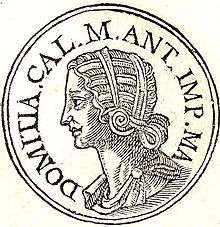Domitia Calvilla
Domitia Calvilla (also known as Domitia Lucilla Minor and Lucilla, died 155–161), was a noble Roman woman who lived in the 2nd century. She is best known as the mother of the Roman Emperor Marcus Aurelius.

Descent
Lucilla was the daughter of Domitia Lucilla Maior (Maior is Latin for the Elder) and the patrician Publius Domitius Calvisius Tullus Ruso[1] and was a niece to Gnaeus Domitius Lucanus. The maternal grandfather of the younger Lucilla, Lucius Catilius Severus was twice consul and became city Prefect. Lucilla’s father served as consul in AD 109 and the date of his second consulship is unknown.[2][3]
Lucilla through her mother had inherited a great fortune, which included a tile and brick factory near Rome, close to the river Tiber. The factory provided bricks to some of Rome's most famous monuments including the Colosseum, Pantheon and the Market of Trajan, and exported bricks to France, Spain, North Africa and all over the Mediterranean.[4]
Marriage
Lucilla married Marcus Annius Verus, a praetor, who came from a wealthy senatorial family.[5] Verus' sister Faustina the Elder was a Roman Empress and married the Roman Emperor Antoninus Pius. Verus was a nephew to Roman Empress Vibia Sabina and his maternal grandmother was Salonina Matidia (niece of Roman Emperor Trajan). With Verus, she had two children, a son, the future Roman Emperor Marcus Aurelius (26 April 121) and a daughter Annia Cornificia Faustina (122/123 – between 152 and 158).
Widowhood
In 124, her husband died. Her children were raised by herself and they were adopted by her father-in-law. Marcus Aurelius would later inherit the tile and brick factory.
In Lucilla's household, the future Roman Emperor Didius Julianus was educated and through her support he was able to start his legal career. Lucilla was a lady of considerable wealth and influence. In his Meditations, Marcus Aurelius describes her as a ‘pious and generous’ person who lived a simple life (1.3n). She spent her final years living with her son in Rome.
Nerva–Antonine family tree
Nerva–Antonine family tree | |
|---|---|
| |
| Notes:
Except where otherwise noted, the notes below indicate that an individual's parentage is as shown in the above family tree.
| |
References:
|
See also
References
- Geoffrey William Adams (2013). Marcus Aurelius in the Historia Augusta and Beyond. Rowman & Littlefield. pp. 57–. ISBN 978-0-7391-7638-2.
- Jo-Ann Shelton (2013). The Women of Pliny's Letters. Routledge. pp. 291–. ISBN 978-0-415-37428-6.
- Jacqueline M. Carlon (22 June 2009). Pliny's Women: Constructing Virtue and Creating Identity in the Roman World. Cambridge University Press. pp. 135–. ISBN 978-0-521-76132-1.
- Annelise Freisenbruch (9 November 2010). Caesars' Wives: Sex, Power, and Politics in the Roman Empire. Simon and Schuster. pp. 171–. ISBN 978-1-4165-8357-8.
- Frank McLynn (20 July 2010). Marcus Aurelius: A Life. Da Capo Press. pp. 14–. ISBN 978-0-306-81916-2.
External links
- Roman Coinage of Domitia Lucilla
- Marble portraits of Domitia Lucilla, under the heading for Marcus Aurelius